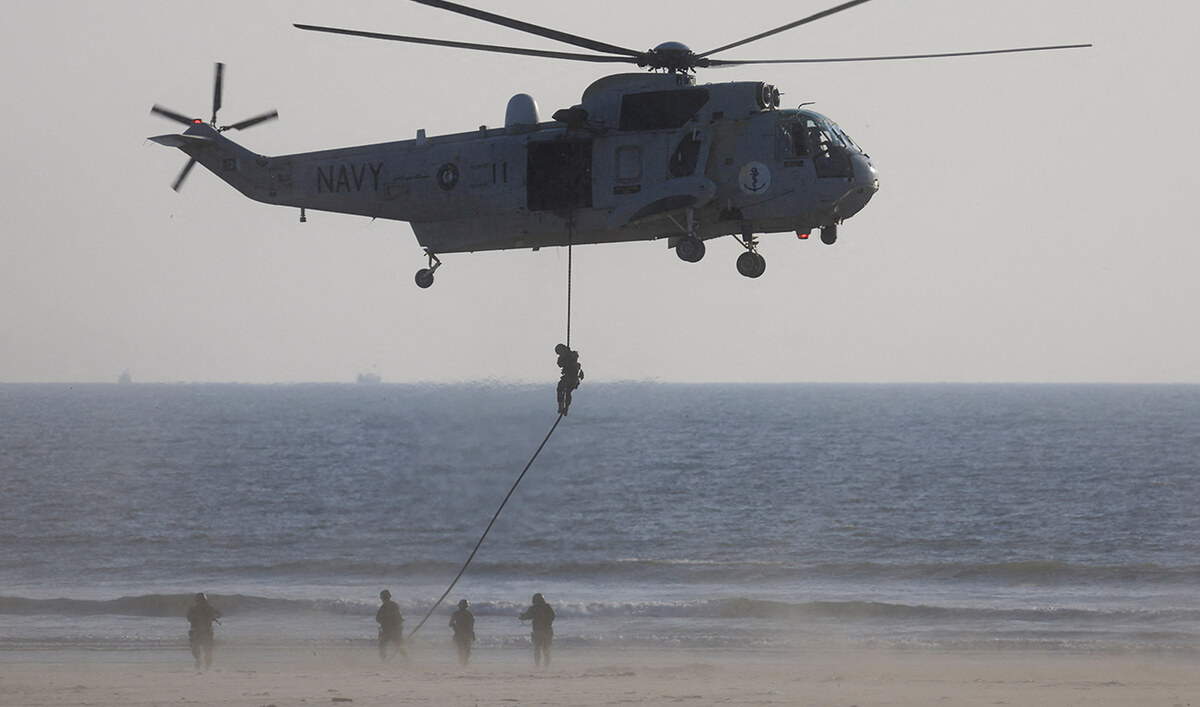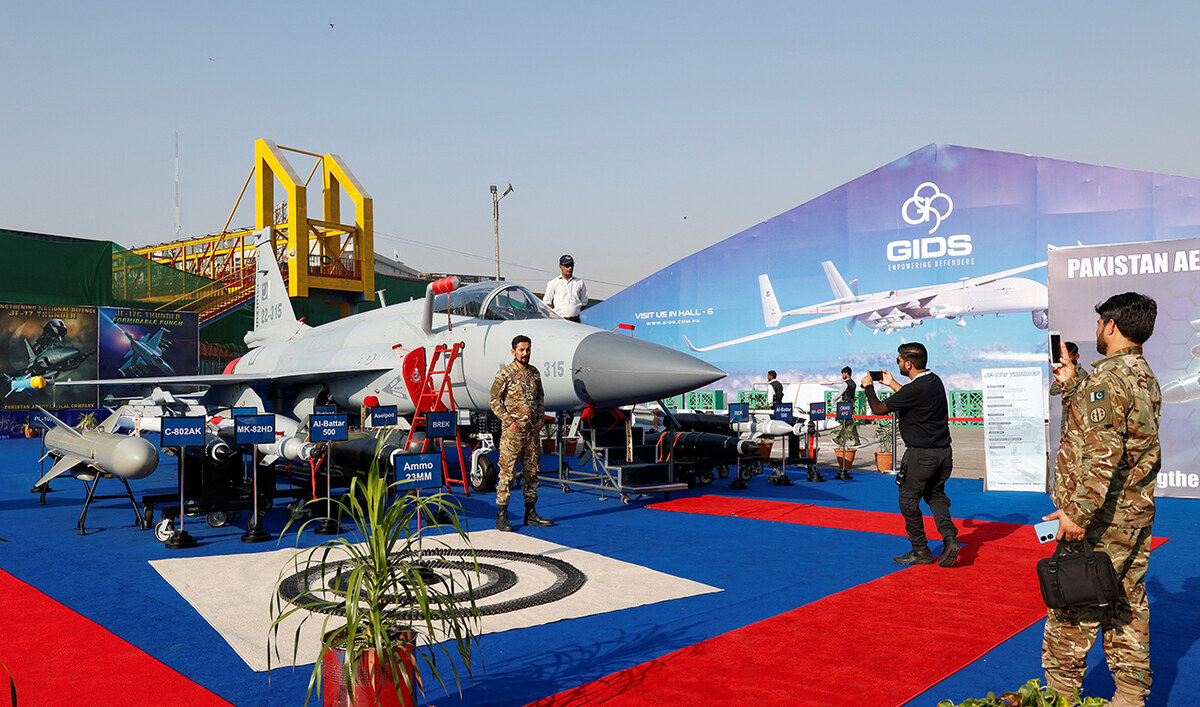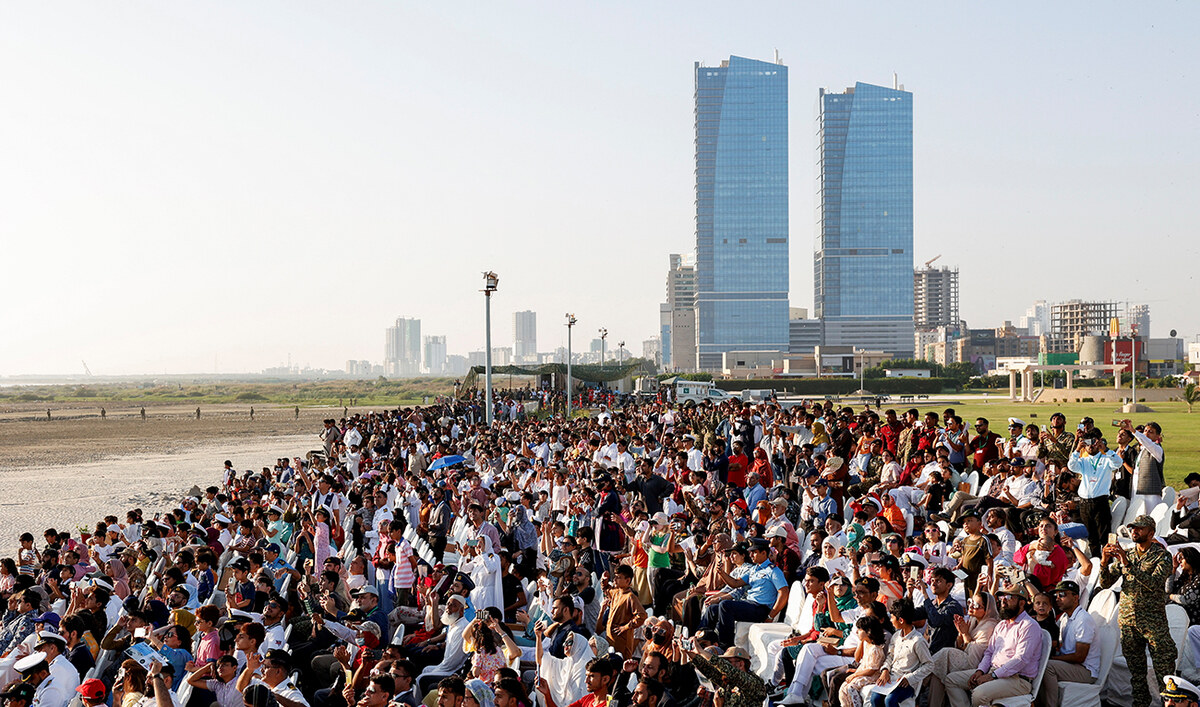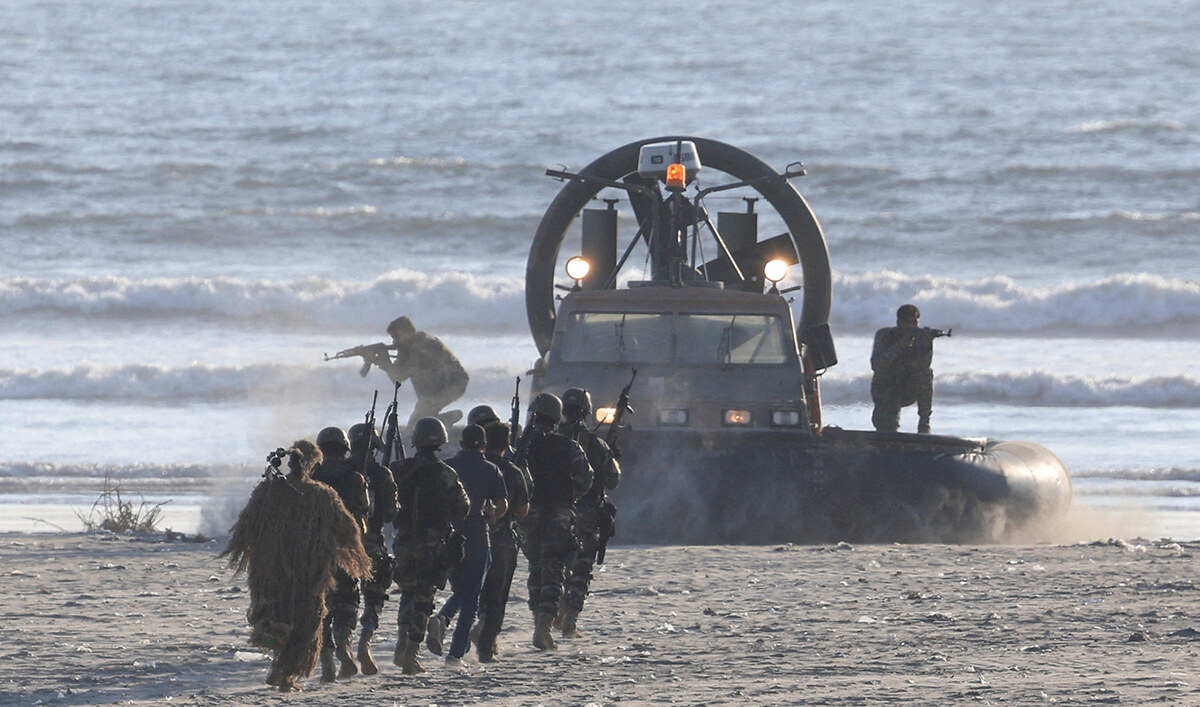ISLAMABAD: Pakistan’s opposition on Wednesday called on the government of Prime Minister Shehbaz Sharif to hold a national debate on Balochistan, a day after a veteran politician announced his resignation from parliament over the deteriorating situation in the southwestern Pakistani province.
Sardar Akhtar Mengal, leader of the Balochistan National Party-Mengal (BNP-M), announced his resignation from Pakistan’s National Assembly on Tuesday, saying the people of the Balochistan province had been “consistently marginalized” and “pushed to the wall.”
Mengal’s announcement came after over 50 people were killed in Balochistan when separatist militants attacked police stations, railway lines and highways on August 25, prompting security forces to launch retaliatory operations.
The assaults were the most widespread in years by ethnic militants fighting a decades-long insurgency to win secession of the resource-rich southwestern province, home to major China-led projects such as a port, and a gold and copper mine.
On Wednesday, Asad Qaiser, a member of the opposition from former PM Imran Khan’s party, said the opposition alliance had expressed “grave concern” over the Balochistan situation and decided to request the National Assembly speaker to initiate a debate on it.
“The government must come and inform parliament what policies it has regarding Balochistan,” he told reporters after an opposition meeting late Wednesday. “We have formed a special committee as we believe there should be an all-party conference on Balochistan, with all political parties and stakeholders on board and a collective decision made to address the concerns of our disgruntled Baloch brothers.”
He criticized the government for “not taking Balochistan seriously,” referring to the announcement of resignation by Mengal, a former Balochistan chief minister.
“He tendered resignation after being disappointed with the present situation,” Qaiser said. “This is a very alarming thing. If your political figures are discouraged this way, they feel that they have lost respect in their [native] area because of this parliament, then this parliament has no value.”
In his resignation letter, Mengal had said the attempts by the people of Balochistan to speak up for their rights or protest were met with “hostility.”
“Our people are either silenced, labeled as traitors, or worse, killed,” he said. “Under such circumstances, I find it impossible to continue in this capacity, as my presence here no longer serves any purpose for the people I represent.”
Balochistan, which borders Iran and Afghanistan, is Pakistan’s most economically backward province, lagging behind the rest of the country by nearly all social and economic indicators. The province has been the site of a decades-long separatist insurgency by ethnic Baloch militants. The separatists say they are fighting what they see as unfair exploitation of the province’s mineral wealth by the federation. The state denies it.
In recent weeks, the province has also witnessed several protests by Baloch people and rights groups against what they describe as a pattern of enforced disappearances and other human rights abuses by security forces, who deny the charge.
Pakistan’s military has recently repeatedly referred to the ethnic rights movement in Balochistan being led by young people, many of them educated women, a “terrorist proxy.”
The decades-old insurgency has continued to keep the mineral-rich province of some 15 million people poor and unstable and created security concerns around Pakistan’s plans to access untapped resources under Balochistan’s desert and mountainous terrain.
The province is home to key mining projects, including Reko Diq, run by Canadian mining giant Barrick Gold and believed to be one of the world’s largest gold and copper mines. Balochistan is an important part of China’s $65 billion investment in the China-Pakistan Economic Corridor (CPEC), a wing of President Xi Jinping’s Belt and Road initiative.
The province also has a long Arabian Sea coastline in the south, not far from the Gulf’s Strait of Hormuz oil shipping lane.
Pakistan opposition calls on government to hold national debate on Balochistan
https://arab.news/bmdup
Pakistan opposition calls on government to hold national debate on Balochistan

- The demand came a day after a veteran politician from Balochistan announced his resignation from parliament
- His resignation followed deadly separatist attacks that killed more than 50 people in Balochistan late last month
Pakistan government doubles down on preventing Imran Khan’s Nov. 24 protest

- Interior Minister Mohsin Naqvi warns no talks if Khan’s PTI proceeds with the protest
- Ex-premier’s party plans a ‘long march’ to Islamabad, seeking his release from prison
ISLAMABAD: Pakistan’s Interior Minister Mohsin Naqvi on Friday vowed to implement the Islamabad High Court’s (IHC) order, refusing to allow former prime minister Imran Khan’s Pakistan Tehreek-e-Insaf (PTI) party to stage the Nov. 24 protest in the federal capital demanding his release.
The PTI has announced a “long march” to Islamabad, primarily to pressurize the government to end Khan’s imprisoned that has lasted for over a year on what his party contends are politically motivated charges. The protest also aims to raise PTI’s voice against alleged rigging in the February 8 general elections while calling for measures to ensure judicial independence, which the party says has been undermined by the 26th constitutional amendment.
Only a day earlier, the IHC directed the government to form a committee to engage in talks with the PTI, emphasizing the need to avoid disruptions during the three-day visit of Belarusian President Aleksandr Lukashenko to discuss bilateral economic cooperation. The court expressed hope that the PTI would allow “meaningful communication” with the administration while acknowledging that the maintenance of law and order would be the government’s priority if there was no breakthrough between the two sides.
Addressing the media in Islamabad alongside the capital city’s chief commissioner and police chief, the interior minister highlighted that no rally, march or protest would be allowed in the federal capital owing to the Belarusian president’s visit to the country, as per the IHC order.
“No one will be allowed to stage a rally or protest in Islamabad in compliance with the high court order,” Naqvi said. “After the IHC order, we will implement it 100 percent at any cost. We are bound by the law to implement it.”
Regarding the IHC directions to hold talks with the PTI party leadership, the minister said he would speak to Prime Minister Shehbaz Sharif in the evening to constitute a committee “but definitely if they stage a protest, this [negotiation] will get difficult.”
Islamabad’s district magistrate has already imposed a two-month ban on the gathering of more than five people in the capital using Section 144 of the Criminal Procedure Code (CrPC), which allows the government to prohibit various forms of political assembly, gatherings, sit-ins, rallies, demonstrations and other activities for a specified period.
In response to a question about whether the government was in touch with Adiala Jail, where ex-premier Khan is currently incarcerated, Naqvi said he has no contact with anyone there.
The interior minister also highlighted that the capital city’s administration did not receive any application from the PTI to stage a protest.
He made it clear that people violating the court orders would be responsible if there was any loss of life during the Nov. 24 protest.
Naqvi also said that he agreed with the residents of Islamabad that shops, roads, businesses and mobile signals should not be shut down but noted there was no other way of dealing with such protests.
“If they want to come and protest [in Islamabad], I’ll be the one who will say that no talks should take place,” he concluded. “If they want to hold talks, they should do it in a proper manner. This is no way that on one side they protest and on the other call for talks.”
Earlier this week, Pakistan’s interior ministry had authorized the deployment of paramilitary Punjab Rangers and Frontier Corps troops in Islamabad to maintain law and order.
Pakistan’s parliament also passed a law earlier this year to regulate public gatherings in Islamabad, specifying timings for rallies and designating specific areas. The law prescribes three-year jail terms for participants in illegal assemblies and 10-year imprisonment for repeat offenders.
Army chief vows action after deadly week of militant attacks in Pakistan

- Twelve soldiers were killed on Tuesday as militants attacked a checkpost in the northwestern Bannu district
- Gunmen opened fire on vehicles carrying minority Shiite community members in KP province on Thursday, killing 41
ISLAMABAD: Pakistan Army Chief General Asim Munir vowed action against militants on Friday, following a week of deadly attacks in which dozens of civilians and security officials have been killed in the country’s northwest.
In the latest attack, gunmen opened fire on vehicles carrying members of the minority Shiite community in Pakistan’s Khyber Pakhtunkhwa province on Thursday, killing at least 41 people in one of the region’s deadliest such attacks in recent years. The assault took place in Kurram, a district where sectarian clashes have killed dozens of people in recent months. No group has claimed responsibility.
On Tuesday, ten Pakistan army soldiers and two from the paramilitary Frontier Constabulary were killed on Tuesday as militants attacked a checkpost in the northwestern Bannu district.
Pakistan’s Khyber Pakhtunkhwa (KP) province in the northwest and the remote southwestern province of Balochistan have both seen an increase in strikes by militants this year.
“He [Munir] reiterated the army’s firm resolve to dismantle hostile terrorist networks and eradicate the illegal spectrum undermining national security,” the army’s media wing said in a statement, quoting Munir as saying after he attended a security meeting in Peshawar, the provincial capital of Khyber Pakhtunkhwa.
“He assured that through synchronized and robust operations, Pakistan Army in collaboration with Law Enforcement Agencies will relentlessly hunt down the enemies of peace to ensure lasting stability and security.”
In a separate statement, the army said it had carried out three operations in Balochistan on Nov. 20-22, in which four militants had been killed.
On Tuesday, Prime Minister Shehbaz Sharif chaired a meeting of civil and military leaders who gave the go-ahead for a "comprehensive operation" against separatist insurgents in Balochistan.
Pushed by Beijing, Pakistan plans military operation against Baloch separatists — analysts

- Government has announced operation but not shared details of scale, scope, whether it will be joint effort with China
- Analysts say military solutions will not work in Balochistan, plagued by low-level separatist insurgency since decades
QUETTA: Pakistan is working out the operational details, scope and scale of a planned military operation in the insurgency-plagued southwestern Balochistan province, officials said this week, with analysts saying pressure from Beijing had convinced Islamabad it was time to take on separatist militants in a region that is home to key Chinese Belt and Road projects.
Following a string of deadly attacks that have targeted its citizens in recent months, China has pushed to join security efforts to protect them and unveiled a plan on Tuesday for joint counter-terrorism exercises in Pakistan. On the same day, Prime Minister Shehbaz Sharif chaired a meeting of civil and military leaders who gave the go-ahead for a “comprehensive operation” against separatist insurgents in Balochistan.
The statement from the prime minister’s office did not give any details of the operation, including whether it was limited to ground operations or could involve the air force, when it would be launched and in which parts of the vast, remote Balochistan province. It also did not mention if the plan would be a joint effort with Beijing and which Pakistani security agencies would take part.
“Nothing has been finalized yet because the meeting was held on Tuesday and further progress regarding the military operation will take time,” Wasim Akram, an information officer at the Ministry of Interior, told Arab News, adding that the scale of the operation and which forces would participate were details that were still being worked out.
Balochistan Government Spokesperson Shahid Rind and Special Secretary Home Department Abdul Nasir Dotani also did not share any specific details on the operation’s scope and scale.
“It was decided in the federal apex committee and it is clear it will be a comprehensive military operation,” Rind told Arab News.
Balochistan Home Secretary Shahab Ali Shah, Balochistan Chief Minister Sarfaraz Bugti, Defense Minister Khawaja Asif and Information Minister Attaullah Tarar could not be reached for comment despite several attempts.
“PRESSURE FROM CHINA”
Pakistan’s military already has a huge presence in Balochistan, which borders Afghanistan and Iran and is home to a decades-long separatist insurgency by militants fighting for a separate homeland to win a larger share of benefits from the resource-rich province. The government and military deny they are exploiting the province’s mineral wealth or ignoring its economic development.
The military has long run intelligence-based operations against insurgent groups, the most prominent being the Baloch Liberation Army (BLA), which has escalated attacks in recent months on the military and nationals from longtime ally China.
The region is home to the Gwadar Port, built by China as part of the China-Pakistan Economic Corridor (CPEC), a $65 billion investment in President Xi Jinping’s Belt and Road infrastructure initiative to expand China’s global reach.
In addition to the recent attacks, the BLA also claimed a suicide bombing last month outside the international airport in the southern port city of Karachi that killed two Chinese engineers.
“There shouldn’t be any ambiguity that Pakistan is facing internal and external pressure, mainly from China, to launch this new offensive against Baloch separatist militants,” Dr. Ayesha Siddiqa, a senior fellow at King’s College in London and a military affairs expert, told Arab News.
“There is increasing pressure from the Chinese government and they are not willing to financially assist Pakistan anymore until the security situation gets better … Pakistan has to demonstrate to the Chinese that we are doing something in Balochistan against Baloch militant groups.”
Shahzad Zulfiqar, a senior journalist who has been covering militancy in Balochistan for over two decades, concurred with Dr. Siddiqa, also pointing to reports that China was pushing Pakistan to allow its own security staff to protect thousands of Chinese citizens working in the South Asian nation.
“Though Pakistan has been taking action against militant groups involved in attacking Chinese nationals, now there is pressure from China which is asking Pakistan to work on a joint security mechanism because Chinese citizens are being targeted and are under threat,” he said.
The foreign office in Islamabad this month denied international media reports Beijing wanted its own security forces on the ground in Pakistan.
Pakistan had raised a security force to protect Chinese nationals and projects, particularly those operating under the CPEC umbrella, and “this security apparatus continues to provide security to Chinese CPEC projects inside Pakistan,” Foreign Office Spokesperson Mumtaz Zahra Baloch told reporters on Nov. 14:
“Pakistan and China have a robust dialogue and cooperation on a range of issues including counterterrorism and security of Chinese nationals in Pakistan … We will continue to work with our Chinese brothers for the safety and security of Chinese nationals, projects and institutions in Pakistan.”
“NO MILITARY SOLUTIONS”
Ethnic Baloch separatists have launched several insurgencies in Balochistan since the birth of Pakistan in 1947, including from 1948-50, 1958–60, 1962–63 and 1973–1977. An ongoing low-level insurgency began in 2003. The army has launched several military campaigns in response, including as early as 1948 in the state of Kalat and a five-year-long operation in the 70s under Prime Minister Zulfiqar Ali Bhutto.
“Many political governments have come and gone in Balochistan but the operation has continued,” Sardar Akhter Jan Mengal, head of the Balochistan National Party (BNP) and a prominent Baloch nationalist leader in the province, told Arab News.
“No one can resolve Balochistan’s political issue with military operations.”
Indeed, political leaders and independent analysts have for years urged the government to take a holistic approach to resolving Balochistan’s problems, which they say stems from decades of economic deprivation and political disenfranchisement. The province, which comprises 44 percent of Pakistan’s total land mass, is its most backward by almost all economic and social indicators.
Rich in land and mineral wealth, most parts of the region often lack even the rudiments of modern life. For instance, though home to Reko Diq, one of the world’s largest undeveloped copper and gold deposits, and the site of major Chinese investment projects, the province lacks employment opportunities and basic facilities like Internet, health and education.
Balochistan is also the least represented in Pakistan’s parliament, where legislative seats are allocated to provinces according to their population. Balochistan has a population of only 14.89 million people in a country of over 240 million and is hence allocated only 16 National Assembly seats. Punjab, with a much smaller land area but a population of 127.68 million, gets 141 seats.
Zulfiqar, the journalist, said military operations needed to be combined with social and economic development as well as “good governance” efforts to be successful.
“This will be the fifth military operation in Balochistan since 1947,” he said. “Military operations are not the only solution to bring peace and stability in Balochistan, there should be more options involved with the military operation, including dialogue and good governance.”
In fact, many fear another military operation in the province will further alienate its citizens, rights activists and political leaders, who have long accused security agencies of arbitrary arrests, extrajudicial killings and other types of rights abuses in the name of cracking down on separatists. The state denies it is involved in such activities.
“This military operation will put more fuel in the fire of hate in Balochistan rather than extinguish it,” BNP’s Mengal said.
Nawab Aslam Raisani, a provincial lawmaker and a senior political and tribal leader in the province, also warned against a military operation.
“We haven’t seen any result of the use of military force,” he said. “This new decision of the apex committee to launch a military operation in Balochistan will push the federation toward more destruction.”
Over 200 investors, entrepreneurs from Pakistan, UAE attend joint business forum in Sharjah

- Sharjah-Pakistan Business Roundtable hosted on Thursday by Sharjah FDI Office, Pakistan Business Council
- UAE is one of Pakistan’s largest trading partners and source of foreign investment, valued at over $10 billion in last 20 years
ISLAMABAD: Over 200 investors and entrepreneurs from Pakistan and the United Arab Emirates (UAE) attended a joint business forum in Sharjah this week to explore bilateral investment opportunities in sectors such as manufacturing, IT, trade and green-tech, state media reported.
The UAE is one of Pakistan’s largest trading partners and a major source of foreign investment, valued at over $10 billion in the last 20 years, according to the UAE ministry of foreign affairs. The UAE-Pakistan trade volume rose to $7.9 billion in 2023, up 12 percent from 2022. In May this year, Prime Minister Shehbaz said the Emirates had committed $10 billion to invest in promising economic sectors in Pakistan. The Pakistan Business Council (PBC), set up this September at the Sharjah Chamber of Commerce and Industry, also aims to increase Pakistan’s bilateral trade volume with the UAE to $40 billion in three years.
The UAE is home to more than a million Pakistani expatriates and the second-largest source of remittances to Pakistan after Saudi Arabia.
“The Sharjah FDI Office (Invest in Sharjah) and the Pakistan Business Council in Sharjah hosted the Sharjah-Pakistan Business Roundtable here on Thursday,” Pakistani state news agency APP reported on Friday.
“The event brought together over 200 investors and entrepreneurs to explore opportunities for strengthening economic ties and fostering bilateral investments between Sharjah and Pakistan.”
Speaking at the event, Consul General Hussain Muhammad, said Pakistan’s economy, workforce, and abundant natural resources offered “immense potential for collaboration” with the Emirates.
“Pakistan’s economy is diverse, with opportunities in agriculture, textiles, information technology, and renewable energy,” the diplomat said. “Sharjah’s investors and businesses could greatly benefit from exploring partnerships in these sectors.”
The consul general said the recent establishment of the Pakistan Business Council in Sharjah was a “testament to the growing collaboration” between the two countries and expressed confidence that the Council would play a “crucial role” in supporting Pakistani investors, facilitating partnerships, and advancing mutual economic interests.
Over 11,500 Pakistani companies are currently registered within Sharjah’s mainland and dedicated Free Zones.
Haider tank, Shahpar fighter drone in spotlight as Pakistan’s top defense expo concludes

- Exhibition hosted over 550 exhibitors and 350 civil and military officials from 55 countries
- IDEAS has been held biennially since 2000 and grown into a key event for defense sector
ISLAMABAD: Pakistan’s top defense exhibition IDEAS 2024 will conclude today, Friday, with the locally manufactured third-generation Haider tank and Shahpar fighter drone among the South Asian nation’s main showpieces.
IDEAS has been held biennially since 2000 and has since grown into a key event for the Pakistani defense sector. This year’s show, running from Nov.19-Nov. 22 in Karachi, hosted over 550 exhibitors, including 340 international defense companies, and more than 350 civil and military officials from 55 countries.
On the first day of the expo, Pakistan launched the Haider tank, locally produced at the Heavy Industry Taxila in collaboration with local and international technology partners. The tank has auto-tracking, a remote-control weapons system and a 470-kilometer cruising range.
The Shahpar-III drone capable of flying at 35,000 feet and carrying heavy weapons such as bombs, cruise missiles and torpedoes, was also launched at the exhibition.
“I had no prior knowledge about these products, but upon visiting, I was astonished to discover such a top-class range of items being exported abroad,” Muhammad Mohsin, a visitor, told media.

“These products, manufactured in Sialkot, Gujranwala, and Karachi, truly showcase exceptional craftsmanship. It is imperative that these remarkable offerings gain greater recognition in international markets.”
Mohsin said he was unaware that Pakistan was exporting a “top-class range of items” in the defense sector until he attended this year’s IDEAS.
The Shahpar-III is a successor to the Shahpar-II drone, which could fly up to 20 hours at a maximum altitude of 23,000 feet, according to Global Industrial Defense Solutions (GIDS), a state-owned Pakistani defense conglomerate that has developed the drones. The Shahpar-III can fly up to 35,000 feet for 24 hours and carry a payload of up to 500 kilograms.

GIDS, which exports its products to 14 countries including Saudi Arabia and the United Arab Emirates, introduced Shahpar-II in 2021.
“This [Shahpar-III] has a more strategic value to an armed force in comparison to Shahpar-II,” Asad Kamal, Chief Executive Officer of GIDS, told Arab News, adding that the drone would soon be inducted into the Pakistan Air Force.
“Shahpar-III is a natural step up when you’re making UAVs drones.”

Kamal said the drone could see targets at night and “take out on the enemy” with heavy weapons.


“That means that from your own borders, you can launch a cruise missile from an unpiloted plane,” he added. “That cruise missile has a range of 250 kilometers. So, it can give any force a lot of firepower value by having this sort of a weapon in its arsenal.”
With inputs from AFP














